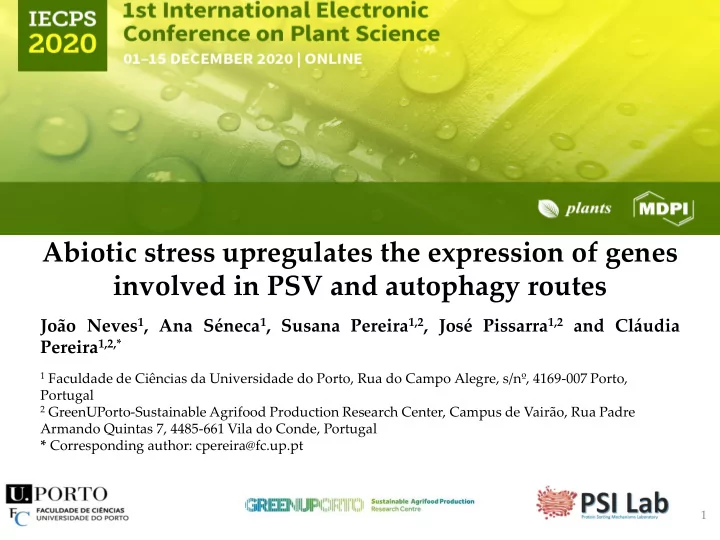

Abiotic stress upregulates the expression of genes involved in PSV and autophagy routes João Neves 1 , Ana Séneca 1 , Susana Pereira 1,2 , José Pissarra 1,2 and Cláudia Pereira 1,2,* 1 Faculdade de Ciências da Universidade do Porto, Rua do Campo Alegre, s/nº, 4169-007 Porto, Portugal 2 GreenUPorto-Sustainable Agrifood Production Research Center, Campus de Vairão, Rua Padre Armando Quintas 7, 4485-661 Vila do Conde, Portugal * Corresponding author: cpereira@fc.up.pt 1
Abstract: Adverse conditions caused by abiotic stress modulate the plant development and growth by altering morphological and cellular mechanisms. To face this problem, plants, along with physiological adaptations, developed intracellular mechanisms, including changes in protein production and trafficking or modifications of the endomembrane system. It is known that stress situations can alter protein sorting to the vacuole, changing their routes via a Golgi-independent pathway. Our goal is to evaluate the expression levels of different aspartic proteinases and well-characterized genes involved in the vacuolar pathway, in plants submitted to different abiotic stresses (osmotic, oxidative, saline and heavy metals). The results obtained point to a different response of the three aspartic proteinases under study, indicating that different, yet related, genes respond differently to different types of stress, resulting in a fine-tuned regulation. Furthermore, our results regarding the endomembrane system effectors show that EXO70, RMR1, SYP51, SYP121 and VTI12 are up regulated, while VAMP, SYP23 and BP80 are downregulated in the same situations. This demonstrates that adverse conditions caused by abiotic stress can alter the expression of key proteins involved in the protein trafficking machinery, which can be related with the activation/deactivation of certain pathways. Keywords: abiotic stress; aspartic proteinases; endomembrane trafficking 2
Introduction Climate change Crop failures Food insecurity Alteration of the intracelular trafficking/sorting Adverse environmental conditions affect growth and development of the plant, so Diferencial expression they developed intracellular of genes related to mechanisms to face this protein sorting conditions, such as: Morphologic changes in the endomembrane system 3
Introduction Plant Specific Insert (PSI) Independent domain, with approximately 100 aminoacidic residues Highly conserved in innumerous species May mediate a Golgi-bypass route to the vacuole Cheung et al (2020) Enzyme inside an enzyme 4
Introduction Exo-70 Endomembrane system effectors SYP121 Several classes of proteins can control specific events of BP-80 / RMR1 membrane transport Adverse environmental conditions SYP 51 / VTI12 can lead to cell reorganization events SYP23 VAMP723 5 Chung and Zeng (2017)
Goal Evaluate the expression levels of different aspartic proteinases and well-characterized genes involved in the vacuolar pathway, in plants submitted to different abiotic stresses 6
Experiments S1 - 50 mM NaCl Germination of Arabidopsis thaliana seeds in S2 – 100 mM NaCl Stress Conditions different stress conditions qPCR H1 – 50 mM Manitol H2 – 100 mM Manitol RNA extraction Ox- 0,5 mM H2O2 and cDNA preparation Zn – 150 µM ZNSO4 7
Results Expression of Aspartic proteinases (AP) • The 3 APs tested respond differently to the stress conditions applied • AP1 (green) is upregulated for all stress conditions • AP2 (orange) is downregulated in oxidative stress condition • AP3 (blue) is upregulated in salt stress condition and downregulated in heavy metal induced stress 8
Discussion Expression of Aspartic proteinases (AP) AP1 is more expressed because the other two have a more restricted pattern Can also point to a more important role of AP1 in response to abiotic stress APs can have an antagonistic response 9
Results Expression of endomembrane system effectors v • RMR1, EXO70, SYP51 and SYP121 are upregulated in most of the stress conditions under study • VAMP, SYP23, and BP80 are downregulated in all the stress conditions tested 10
Results Expression of endomembrane system effectors • VTI12 is upregulated in all the stress conditions but the increase in this gene expression is much higher when compared to the other genes tested, particularly in the salt stress situation. 11
Discussion Expression of endomembrane system effectors Exo-70 SYP121 BP-80 / RMR1 SYP 51 / VTI12 SYP23 VAMP723 12 Chung and Zeng (2017)
Discussion Expression of endomembrane system effectors RMR1 is implicated in the sorting of storage proteins to the PSV BP80 is responsible for protein transport to the lytic vacuole This can indicate that plant cells are able to shift their sorting mechanisms towards a more restrained state 13 Xiang et al (2012)
Discussion Expression of endomembrane system effectors Hypothesis: Plant cells can shift their sorting mechanisms towards a more restrained state SYP51 and VTI12 are positive regulators of proteins with a CtVSD in their sorting to PSVs 14
Discussion Expression of endomembrane system effectors Stress response induce autophagy pathaway VTI12 have a role in this process, such as EXO70 15
Discussion Expression of endomembrane system effectors SYP121 is important to control the cellular volume and osmitic adjustments SYP23 andVAMP723 are not well characterized 16
Conclusion Environmental conditions Physiological processes relative to survival and growth Membrane reorganization and gene expression 17
Ackowledgments • This research was supported by and in the frame of the scientific project PTDC/BIA-FBT/32013/2017, funded by FCT. 18
Recommend
More recommend